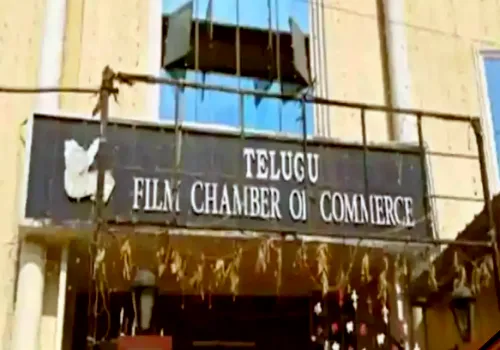
Telugu Film Chamber have been asked to take a quick resolution regarding the salary hike demands of Film Workers from Telugu Film Industry Employee Federation. The federation has asked to implement 30% hike in wages agreement from 4th August and stated that they will work with only those producers who accept their demands.
Mythri Movie Makers have decided to employ workers from Mumbai to finish Pawan Kalyan’s Ustad Bhagat Singh. This became controversial as TFIEF targeted Pawan Kalyana nd stated that he has no real responsibility and concern towards Telugu workers. Telugu Film Producers have met with Chamber panel and issued their concerns.
Looking at their representation, Chamber took a decision to bypass Film Employee Unions and work with new technicians, who are willing to work. They are stating that workers don’t need union memberships to work in films, anymore. Looks like Chamber has decided to fight with federation head on with these moves.
Total points of resolution by TFCC:
1. The Telugu film industry across Telangana and Andhra Pradesh is already facing several challenges. At a time like this, when discussions are underway under the guidance of the respected Labour Commissioner to resolve wage issues amicably, it is unfortunate that the Federation has disregarded the Commissioner’s direction. They have announced that starting August 4th, 2025, a 30% wage hike will be applicable only to those who provide a confirmation letter from the producer, which must be communicated to the respective unions through the Federation. This decision undermines the spirit of fair and sincere negotiations.
2. The wage hike being demanded by the unions is far beyond what small producers in Telangana and Andhra Pradesh can afford. Most small producers have strongly opposed this demand, as it is simply unsustainable for them. As per the Minimum Wages Act, producers have the right to employ any worker who is paid the legally mandated minimum wage, a fact clarified by the Labour Commissioner. Furthermore, the Competition Commission of India (CCI) has issued a directive upholding producers’ autonomy and has discouraged the enforcement of anti-competitive practices that limit producer freedom.
3. Compared to other major metropolitan cities in India, the cost of living in Hyderabad is significantly lower. Despite this, workers in the Telugu film industry are being paid wages that are higher than those paid in other regional industries across the country.
4. In this context, the Telugu Film Chamber has unanimously passed a resolution. According to this, producers are willing to work with any skilled technicians or workers who are ready to work at mutually agreeable wages, regardless of whether they are affiliated with a union or not. Many enthusiastic and skilled individuals are ready to work in the industry, but unions are creating hurdles by demanding large sums—sometimes in lakhs—for membership, effectively blocking their entry. This unfairly deprives talented workers of opportunities. Every producer should have the freedom to hire based on the requirements of the project and the capabilities of the worker.
5. The producers have unanimously agreed to work with any aspiring and skilled technicians or workers who wish to enter the film industry. There is no need to pay lakhs of rupees for union membership. Our goal is to create opportunities for genuinely skilled workers.
6. The Telugu Film Chamber of Commerce works closely with artists, technicians, and other stakeholders from various fields within the industry. The Chamber continues to strive toward a fair and constructive resolution that ensures the welfare of everyone involved.
7. There is no film industry without producers. It is imperative that the welfare of producers is prioritized to ensure the survival and growth of the film industry. Labour unions must recognize this once again and act accordingly.






